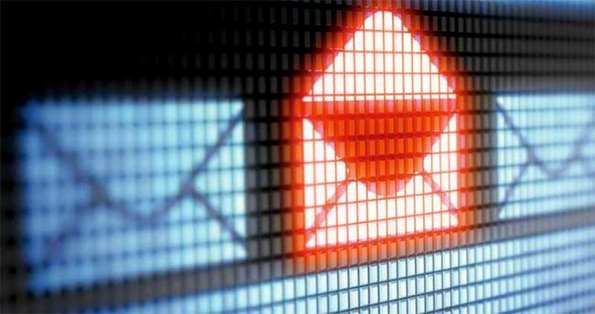Column: The perils of email in the broadcast workplace

Subscribe to NewscastStudio for the latest news, project case studies and product announcements in broadcast technology, creative design and engineering delivered to your inbox.
I remember the first days of email.
It felt exciting to participate in this new frontier of free communication … especially with girls. Many years later, in the beginning of our relationship, me and my wife (who wasn’t yet my wife) emailed each other routinely. I enjoyed coming home after getting kicked around by dumpy downtown theaters or decor lighting companies to long updates about her day and life. In many ways I owe everything to email. So it pains me to say this, but I could live a perfectly happy life never sending or receiving another email again.
I’m hardly alone.
Worker surveys routinely show voluminous email loads decrease employee happiness.
It also decreases worker productivity. Studies show the constant ding of arriving emails breaks our concentration. Many time management and organizational self-help books say to limit reading and responding to emails to particular times during the day. That ding voraciously eats away family and personal time. It also contributes to an “always available” mentality, which is neither healthy nor sustainable long term. Burnt out employees cost companies money to replace. Corporations also must maintain IT infrastructure to handle the email traffic while storing terabytes of emails and their attachments.
However, in this industry, email is not something we can avoid. TV and film production demands attention and at odd times of the day. Many of us work remotely. Email also allows for greater collaboration between multiple vendors. Our clients talk to us primary through email. Clearly it’s here to stay. What’s a thoughtful industry professional to do?
First internalize one, great Truth regarding email: It is not private.
Sure, it feels private. It feels like just a quick conversation between you and the recipient. However, anybody remotely familiar with how the Internet works knows this illusion lulls us into complacency.
Email flows through a myriad of devices before reaching its final destination; it can be intercepted at multiple points. Malware (sometimes from email) like key loggers and trojans can defeat security. It also sits on company servers waiting to be “discovered” by a third party in Sent or Trash mailboxes for months or years, often in unencrypted states. Public and semi-private wireless networks, which many of us use as a lifeline to our colleagues while on location, may or may not encrypt traffic between them and your computer. Email just is not inherently secure.
So if email is not secure, then probably at some point your email will be read by someone other than you intended, those silly signature disclaimers aside. Embarrassment will likely ensue. Once I sent an email to a client that was about that client. It was meant for a co-worker, but I accidentally typed her name into the To field because I was distracted. Embarrassing, but not costly. Thankfully I didn’t say anything unrepeatable.
Sony’s email hack this past November marks the other end of the spectrum. Countless emails of internal squabbles and opinions are now public, and the fallout continues to present day. While I don’t think anyone working in the industry was shocked at the bluntness and salty talk, outsiders lapped up the exchanges with rabid fervor. Nobody looks particularly competent.
In our perception-based industry, public embarrassment is bad enough.
In extreme cases you can end up in court. Emails can be subpoenaed for court cases and may be used against you or your employer. More likely an errant email will cost us a client, job, or talent, all of which could have serious financial ramifications to the show or project.
What’s the easiest thing to do? Delete email. Seriously, just delete it. Chances are in your Trash or Sent mailboxes hundreds, if not thousands, of emails currently sit awaiting rediscovery. Take a look through them and imagine what would happen if they became public. When sufficiently horrified, delete them all. It’s not worth it. If emails must be saved, download them to your primary computer. If sensitive, encrypt them. Storing large amounts of data has environmental costs — electricity powers bloated servers or large data centers — so by deleting email you’re actually helping the environment too.
On the server side, IT policies should mandate that email get purged automatically after a set period if the user takes no action. This is a paradigm shift, which many companies are adopting. Should archiving be required, it can be done at the sever level on a routine basis. It should also be heavily encrypted.
On mobile devices, don’t sync more than a few weeks worth of email. In case your device gets stolen or hacked, the embarrassment won’t extend too far back. Sync folders of email needed for current projects, but never anything sensitive or potentially damaging.
If you’re going abroad, investigate using a VPN tunnel. If your company does not provide one, several companies will for a small monthly fee. I use Tunnel Bear. In countries with questionable civilian surveillance practices, leave any electronics possible at home. Wipe everything else immediately upon returning home. Also, change your passwords.
Know and prepare for the day you are hacked. Send emails to your contacts if they received a virus-laden email from you. If your account is hijacked, get your IT person to shut it down. Work email should never be auto-forwarded to a personal account because of the difficulty it can be to restore control. Much damage can be done in the interim.
Lastly, don’t send sensitive or potentially embarrassing emails. When in doubt, call. The ideal email is one to four sentences long and informational in nature. Dry, boring, and not inflammatory. I tend to send emails as if I’m speaking over RTS or CB radio.
I’ve become anti-email in recent years.
When I get in trouble at work, it’s generally because of email.
While exchanging bits of information does work well, having an important conversation via email annoys me. I disdain cc’ing or group discussions. These days I rarely read emails longer than a paragraph. I generally don’t even check it before noon since my shift starts at 3 P.M. On vacation I go so far as to remove it from my devices completely. If for some reason my email could not be left unattended, I would give an assistant or colleague access to monitor things for me.
I do all this for my own sanity. Plus saving my employer embarrassment or from losing a client is good practice. Burnout in television is common at my level; I’d like to avoid it. I am better at my job when ignoring the scrum of constant email traffic I live under. I can focus better on clients and the shows I work on. I am more relaxed, rested, and able to handle the stresses of a live TV environment on a continual basis.
Email strikes me as the kudzu of the business world — invasive, prolific, and profoundly suffocating. Much of our professional lives, especially in lighting, we are constantly tasked with using the right tool for the job. Email is a tool, and its ability to quickly exchange bits of information is incredibly useful. For longer discussions and sensitive information, it turns out there’s a better (though older) tool already invented available for use anytime. They say it’s called a telephone.
Lance Darcy is a Lighting Director for The Lighting Design Group, based in New York City.
Subscribe to NewscastStudio for the latest news, project case studies and product announcements in broadcast technology, creative design and engineering delivered to your inbox.





tags
column, email, email in the workplace, email perils, lance darcy
categories
Featured, Voices